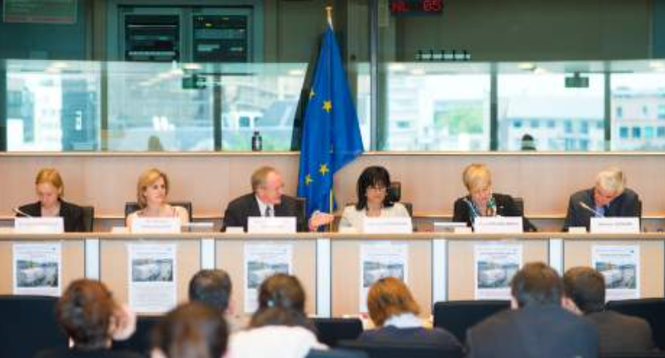
On 5 June, H.E. Michèle Striffler, Permanent Rapporteur of the European Parliament for Humanitarian Aid, hosted the Parliament’s first-ever event examining the regulation of international disaster relief. She introduced a high-level panel from ECHO, the IFRC, OCHA and the German government to speak about the major problems in relief cooperation and what European Union member states and institutions might do, both inside and outside Europe.
In his keynote address, ECHO Director-General Claus Sorensen cited a litany of regulatory problems from recent disasters: “Fire-fighting pilots turned back because they are not accredited as civilian pilots; Swiss rescue dogs not permitted to address avalanches on the Himalayas; NGOs not being accredited in danger zones; young volunteers working on tourist visas because they are not accredited, which poses host of problems with insurance, repatriation and liability; doctors whose certifications are not being recognized... These are not theoretical issues – they affect our very real daily business,” he asserted. At the same time, he emphasized that the issue is not only about the relevant laws, but about their interpretation and the political will of the states involved. While celebrating the progress made in the EU in the last few years, for example, the development of new guidelines on “host nation support”, he acknowledged the need for continued work both within Europe and with its partners to promote greater legal preparedness – including as an element the larger international “aid effectiveness” agenda.
These sentiments were echoed in the remarks of IFRC Vice President Eva von Oelreich, OCHA Delegation Head Antoine Gerard, Head of the Humanitarian Task Force of the German Federal Foreign Office Eltje Aderhold and ECHO Director for Strategy, Policy and International Cooperation Florika Fink-Hooijer.
“The current lack of legal preparedness is leading to slower and less effective humanitarian aid to people in desperate situations. Our traditional ad hoc approaches simply are not working anymore. Those people deserve our advocacy – and this is one preparedness step that is relatively inexpensive and uncontroversial,” Ms von Oelreich asserted. She called on EU member states and institutions to take a more active role in promoting legal preparedness, particularly in countries that often receive emergency aid. This could include support for self-assessments by vulnerable states as well as more formal dialogues on international disaster response law or IDRL-related issues, for example in the context of the EU’s cooperation with the Africa, Caribbean, and Pacific group of states.
“This issue is new to some of us in the humanitarian community,” noted Mr Gerard, “we are not used to long-term thinking for short-term interventions.” He insisted that “we must work harder to reduce bureaucratic obstacles,” and at the same time the international community can organize itself better so as to ease the regulatory role of the affected states and to recognize and incorporate new players in the field of relief. He opined that much more good would flow from “nurturing and guiding” states in improving their preparedness for international cooperation prior to major disasters, rather than pointing fingers when problems arise.
Dr Aderhold underlined the importance that Germany attaches to the issue of disaster preparedness. She noted that Germany has been championing an initiative to rethink the way that donor states promote preparedness in affected states, the results of which would be presented in a June meeting in Berlin. She saw legal preparedness for international cooperation as an important aspect of this effort, noting that “the IFRC’s IDRL project was and still is of the utmost importance as it not only established the Guidelines but also contributed enormously to the necessary advocacy of the topic. Adding to this, by supporting countries in their efforts to implement these legal frameworks, the IDRL project is directly operationalizing the concept on the ground.”
Dr Fink-Hoojier emphasized that legal preparedness for disaster cooperation was important for all countries, rich and poor, pointing to difficulties experienced by the United States after hurricane Katrina and Japan after the Great East Japan Earthquake. She noted that the EU “is in a unique position to help - on the IFRC’s recommendations. We have a commitment and we want to continue with it to promote a supportive regulatory environment.” She noted the significant EU experience in promoting civil protection cooperation that can be shared, as well as opportunities such as the EU’s regular dialogue with countries around trade-related issues (such as phytosanitary controls and customs tariffs on imports) in which the issue of exemptions for humanitarian purposes might be included.
A full report of the event will be made available on the IFRC website.